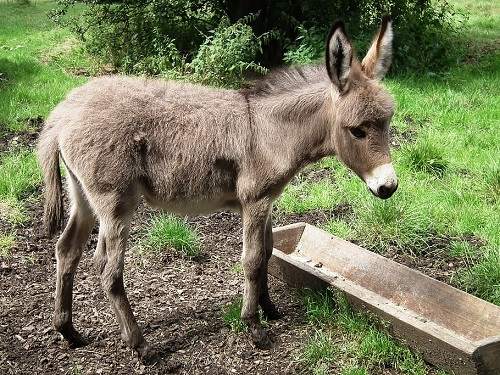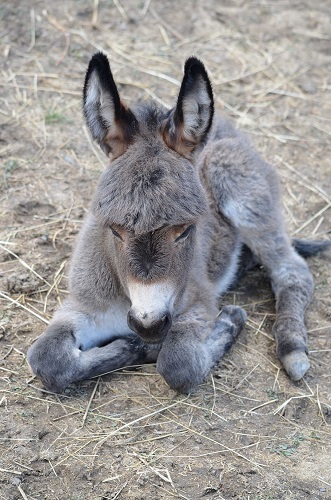Donkeys are among the animals that will not give you a hard time raising them. They tend to be low maintenance and resilient animals. Even though they are more resistant to diseases than other equines, donkeys too fall ill at times. And the top reasons that account for donkey health problems are usually related to their hooves and teeth. Read on to find out about some of the common health problems in donkeys and ways to prevent them.
1. Colic
Colic is not a disease per say, but a condition where your donkey would be facing severe abdominal pain. It is an emergency that will require immediate treatment from the veterinarian. Ways to diagnose colic include assessing the donkey’s heart rate, respiratory rate, gut sounds, history, and other medical examinations. Intestinal blocks, excess build-up of gas, stomach ulcers, twisted intestines, etc., are some of the causes that lead to colic. Dehydration could also cause colic.
Once the veterinarian confirms that the donkey is suffering from colic, the vet will focus on bringing back the donkey’s gut to normal state. Intravenous fluids would be administered to restore the water content in the donkey’s body and measures will be taken to reduce their pain. And in severe cases, surgery would be required. The vet will have to go for surgery if the donkey is in extreme pain or find distended intestines.
Colic is a serious condition to treat and take care of, once it is confirmed. So, it is always better to prevent the causes than to treat it once it happens. You could reduce the risk of your donkeys getting colic by providing them with the best forage, not giving them moldy food, controlling their grazing time in rich pastures, and only introducing new diets and food items slowly and gradually. These could help in maintaining the donkey’s gut health and keeping them away from pain.
2. Hyperlipaemia
Hyperlipaemia is a life-threatening condition in donkeys that is commonly seen in donkeys. It is the situation when the donkey’s bloodstream has a higher fat content, which if left untreated can lead to organ failure and kidney degeneration. Donkeys that are insulin resistant are at higher risks of developing hyperlipaemia.
If your donkey is suffering from hyperlipaemia, their overall mood will turn dull and could seem like they have depression. They will be lethargic and would not have an appetite. Their gums might turn redder and you could also find them breathing rapidly. Older donkeys are also more susceptible to getting hyperlipaemia. Pregnant donkeys, who would require extra nutrition can also contract the disease if their diets are changed suddenly.

It is also important to monitor and regulate the donkey’s weight, as obesity is one of the main reasons that causes hyperlipaemia. Reducing stressful environments and providing them shelter in adverse weather would help in preventing hyperlipaemia. Once the condition is diagnosed, the veterinarian will administer anti-inflammatories, fluid therapies, and measures to provide nutrition to the donkey.
3. Laminitis and other Foot Problems
Laminitis is yet another serious condition that requires proper care and treatment. It is often irreversible; hence, it is all the more important to prevent your donkeys from getting it. Since donkeys hail from harsh and arid climates, they are physically more adapted to less nutritious food and water. But when they are domesticated in places that have rich green pastures and nutritious food items, it could lead them to put on extra weight, which in turn will increase their risk of developing laminitis.
Laminitis is caused when the laminae tissue gets swelled up, which then withdraws from providing the pedal bone the support it requires. This results in an extremely painful situation for the donkey. Maintaining a healthy weight by frequently monitoring their food intake is necessary to prevent such a situation from happening.
Foot conditions such as foot abscesses, infections, and seedy toes are also some of the health problems that donkeys face. Donkeys’ feet are capable of retaining water since they used to live in dry regions of the world. But when domestic donkeys live in damper climates, it could lead to these kinds of foot diseases. Hence, always remember to provide your donkey with a dry barn and make them undergo regular hoof trimming.
4. Respiratory Diseases
Donkeys can contract respiratory disease, commonly caused by bacterial and viral infections. This can be diagnosed by monitoring symptoms like coughing, nasal discharge, and fever. It will be more difficult to identify respiratory problems in donkeys than horses, as they do not have a strong cough reflex.
Most of the respiratory diseases that donkeys suffer from can also be seen in horses. Strangles is the most serious one among them, with lungworm, equine influenza, and equine herpes virus being the common causes of respiratory diseases. Donkeys are often asymptomatic carriers of lungworm. So, they could pass it to other horses and ponies if they come in contact. Hence, it is important to give medication to all the others the carrier has had contact to prevent the hassle.

Donkeys are stoic animals. This makes it even more difficult to diagnose the symptoms if any. So, it is important to always keep an eye on their behavior and consult a veterinarian if you find something suspicious. Also, make sure to give them vaccinations on time and have them get checkups regularly.
5. Parasites
Donkeys have in them a number of parasites, whose count if not controlled can harm the donkey’s overall health. Some of the symptoms that point towards parasite rush include lethargy and weakness, anemia, colic, diarrhea, weight loss, discolored coat, etc. Regular deworming of the donkeys is necessary to control the amount of parasites in their body, which promotes their well-being.
Tapeworms, ascaris, pinworms, and strongyles are some of the common parasites that could give a hard time to you and your donkeys. Deworm your donkeys regularly and consult a veterinarian with the frequency of the deworming process, after monitoring the donkey’s health. You can find dewormers in different forms like gels, pastes, and tablets, from which you could choose the most convenient one.
Conclusion
Given above are some of the common health problems in donkeys that you must be aware of, if you are planning to raise donkeys. Though these conditions can turn fatal if left untreated, there are many ways to prevent the donkeys from contracting the diseases in the first place. So, adopt the right measures and look out for any changes in their behavior and mood to prevent any donkey health problems.

![5 Common Health Problems in Donkeys [And Ways to Prevent Them] donkey health problems](https://donkeyonfarm.com/wp-content/uploads/2023/09/donkey-foot-problems_11zon.jpg)

![How Cold is Too Cold for a Donkey? [Plus Tips to Keep Them Warm] How-Cold-is-Too-Cold-for-a-Donkey](https://donkeyonfarm.com/wp-content/uploads/2022/09/How-Cold-is-Too-Cold-for-a-Donkey-270x180.jpg)
![Can Miniature Donkeys Be Therapy Animals? [Hint: They’re Different] can-miniature-donkeys-be-therapy-animals](https://donkeyonfarm.com/wp-content/uploads/2024/10/can-miniature-donkeys-be-therapy-animals-270x180.jpg)
![Do Donkeys Laugh? [Plus Why Do They Do It?] do-donkeys-laugh](https://donkeyonfarm.com/wp-content/uploads/2022/08/Why-do-donkeys-laugh-270x180.jpg)
![How to Get Rid of Flies on Your Donkey? [Plus Prevention Methods] How to Get Rid of Flies on your Donkey](https://donkeyonfarm.com/wp-content/uploads/2022/05/How-to-Get-Rid-of-Flies-on-your-Donkey-270x180.jpg)